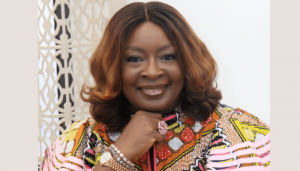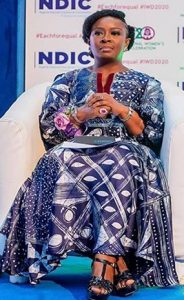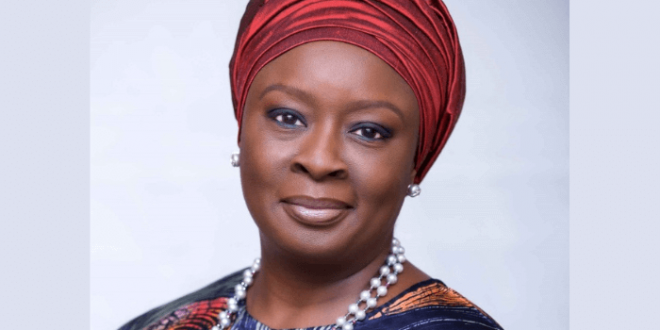 By Kemi Ajumobi
By Kemi Ajumobi
Ronke Sokefun is currently serveing as the Board Chairman of the Nigerian Deposit Insurance Corporation (NDIC), a position she assumed in 2019.
In her capacity as Chairman, she has continued to bolster the organisation’s reputation as a critical player in the Nigerian financial sector with collaborative agreements geared towards achieving global industry standards.
Prior to joining the Corporation as Board Chairman, she served in the Ogun State Government as Commissioner of Agriculture and later Commissioner for Urban and Physical Planning, providing strategic leadership and overseeing seamless execution of government policy from 2012 to 2019.
Her involvement in governance was kick-started in 2011 when she served as the Special Adviser/ Director-General, Bureau of Lands & Survey from 2011 to 2012.
Before her foray into public service, she gained extensive experience in the private sector, rising through the ranks of her profession as a trained lawyer.
Between 1990 and 1993, she worked in Ighodalo & Associates, a Company Secretarial firm. While there, she qualified as a member of the Institute of Chartered Secretaries & Administrators and later moved on to become a partner at Aluko & Oyebode.
Armed with extensive experience and industry expertise, she went on to become Head, Management Services of Ocean & Oil Services in 2002, and Head, Legal Services of the Oando Group when it was formed in 2004, rising to the position of Group Chief Legal Officer of the Group in 2007, a position she held until 2011 when she heeded the call of public service.
As part of her commitment to giving back to society, she has an NGO known as the “M.R.S. Foundation”. The Foundation is focused on social intervention programmes to augment government efforts.
Sokefun is a fellow of the Institute of Directors, a member of the Institute of Chartered Secretaries & Administrators, the Nigerian Bar Association, the International Bar Association, and the Association of International Petroleum Negotiators.
She graduated with honours from the Faculty of Law, Ogun State University (now Olabisi Onabanjo University) as the best student in Jurisprudence & Legal Theory and Commercial Law.
Tell us about your formative years and influences
I grew up with parents who were both educationists. They retired as secondary school principals, though my dad ventured into politics at some point.
It was fun growing up with my sisters and at the same time, our parents were strict, but not overly strict. You had no excuse for missing household chores on Saturdays or morning mass on Sundays. I can’t remember any of us ever missing classes, so that never even came up.
In essence, the way I was raised has helped me tremendously with my growth as a person and professionally.
For instance, when it comes to punctuality, I am a stickler for timing as I believe it impacts on everything else.
The core value for me however is integrity. It is the bedrock for most other values.
You were Commissioner of Agriculture and later Commissioner for Urban and Physical Planning. In both capacities, what changes did you effect?
As Commissioner for Agriculture, my key focus was on maximising the Agricultural value chain and also integrating the youths along the value chain.
I also worked on easing access to land by simplifying the process.
I equally created a model Greenhouse farm which metamorphosed into a train the trainer model.
In addition, I established a modern hatchery to increase poultry production.
As Commissioner for Urban & Physical Planning, my focus was on improving the State’s ranking on the ease of doing business metrics.
I therefore embarked on a holistic process reengineering which ultimately eased the approval process for obtaining construction permits.
Tell us about your transition to public service. How was that for you?
Prior to coming to the public sector, keep in mind that I had already worked in the private sector for over 20 years with diverse experience in corporate law practice, so I was mentally and professionally prepared to serve, and this eased the transition from private to public sector.
Yes, of course, both are complimentary, however, the way the two operate are not exactly the same.
For instance, the initial challenge was the manual processing of most transactions which we eventually addressed by commencing ERP solutions.
The people that I worked with (smart, competent, dedicated staff) also made the transition easy.
For me, the public sector is about call to service, and the fact that I could render service and resolve issues at that level is rewarding in itself.
What does NDIC do, and as board chairman, what are your responsibilities and how are you carrying it out?
NDIC is a core part of the financial services safety net, but what does that really mean to the average person on the street? Good question. It is interesting you asked about my responsibility.
Part of my responsibility is to convey to anyone who has deposits in a CBN-licensed financial institution that NDIC is the agency that guarantees their deposits.
That means, it is our job to make sure that your savings in the Bank is safe and secure. By that I mean, any Bank, and all financial institutions, as long as it is licensed by the CBN.
Permit me to spend a bit more time responding in detail to this question because it is quite broad.
As Board Chairman, my job also includes coordinating the activities of the Board of Directors which is charged with the responsibility for policy direction and oversight of operations of the corporation.
As a revenue generating public entity, we are obliged under the Fiscal Responsibility Act to contribute part of our revenue to the Consolidation Revenue Fund (CRF).
I am pleased to report that a key part of the achievements of the current board includes improving on the established practice over the years of year-on-year increase in our CRF remittances to the Federal Government.
Cumulatively, total remittances are approaching a quarter of a trillion and close to 80% of the remittances to date was in the last 4 years.
The corporation actually received a written commendation from the oversight commission for its consistency in this regard.
However, this could not have been possible without focus on our people, our staff, which in my opinion, even in this age of technology and data science, employees remain the most important competitive asset any organisation could have.
At the Board, we are focused on creating a work environment that would rank among the best workplaces in Nigeria.
We have recently introduced a harassment-free workplace policy to protect employees from both verbal and physical harassment be it from peers, subordinates and/or superiors.
The policy has a wide coverage including cyber bullying.
I have been in both public and private sector for over 25 years and I can say confidently that, our zero tolerance for harrassment policy is very comprehensive, and in my opinion, we should rank among the top-3 in the country.
 As a female board chair, are there peculiar challenges?
As a female board chair, are there peculiar challenges?
You know what? I get asked this question pretty often, I actually think yes, we as a society need to have this type of discussions especially as we are gradually emerging from a male-focused world to a human world.
Now, having said that, I am not certain there is any job that does not have challenges irrespective of gender.
The important thing in my estimation is to be well equipped for any job one signs for.
Once you demonstrate knowledge of the job, fairness to all, respect for your peers and subordinates, and exhibit a high level of responsibility, you will earn the respect of your colleagues and that, has been my experience.
*By Kemi Ajumobi is the Associate Editor, BusinessDay
 Startrend International Magazine For Your Latest News And Entertainment Gists
Startrend International Magazine For Your Latest News And Entertainment Gists





